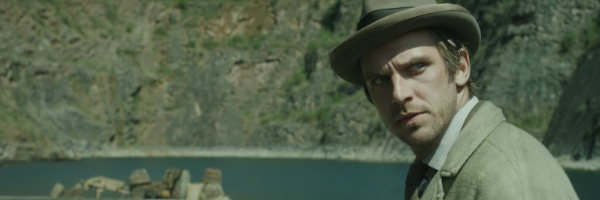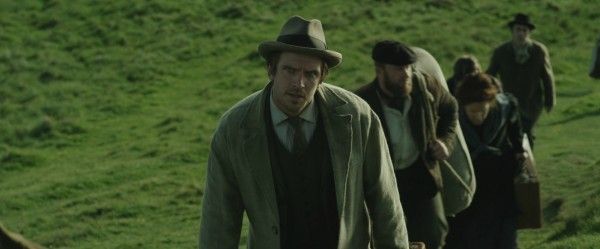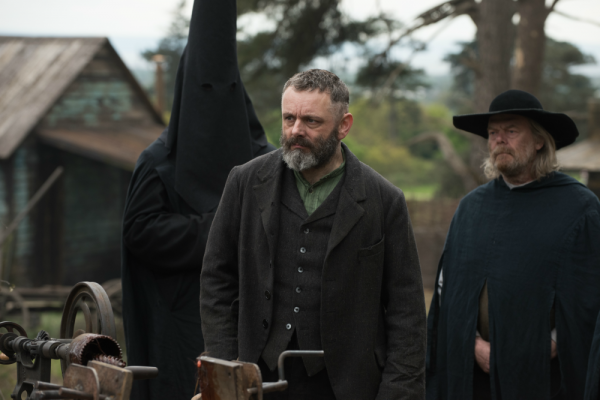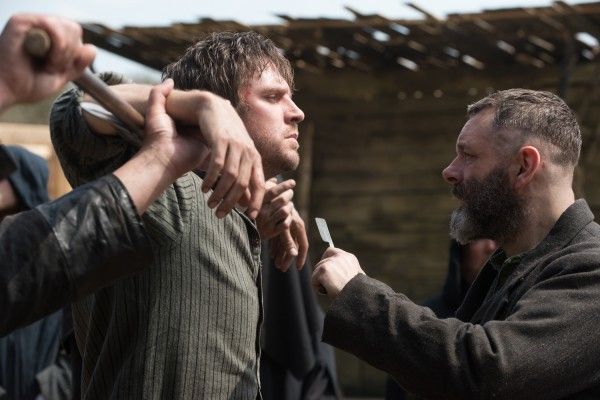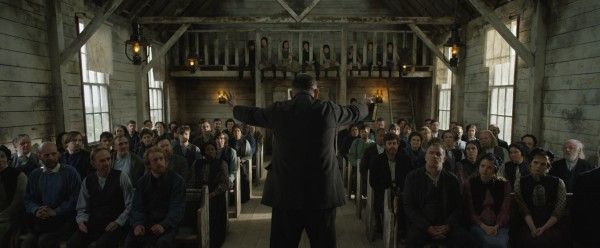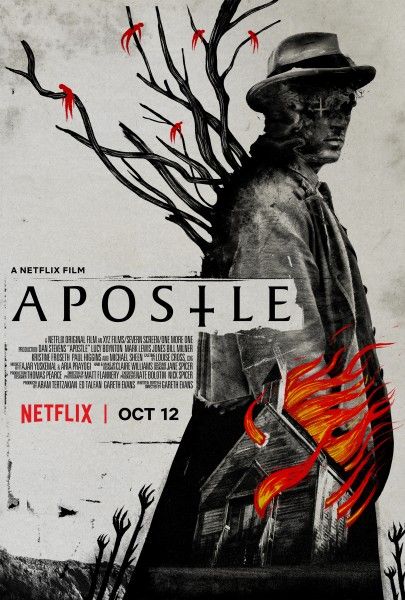Boy, Gareth Evans sure knows how to mangle some bodies. The Raid and The Raid 2 director brings his talents to the horror genre with Apostle, the new Netflix film that stars Dan Stevens as Thomas, a man who travels to a remote island and faces down a super spooky cult that's taken his beloved sister hostage.
Ransom letter in hand, Thomas heads to the island of Erisden, where a group of ex-Englishmen have forged a new community meant to be rid of war, taxes, and the evils of society. Led by the prophet Malcom (Michael Sheen) and his cohorts Quinn (Mark Lewis Jones) and Frank (Paul Higgins), the people of Erisden worship a mysterious goddess, who Malcolm promises will bring them fortune and good harvest. The only problem is... she's not.
Turns out this cult isn't crazy, there really is a goddess on this island who directly controls the fruitfulness of the land and life there -- and when she was discovered, the trio took her into captivity and locked her away, feeding her blood to keep the island fertile. First they fed her animal blood. Then, when that failed, they moved to human blood -- hence the mysterious "receptacles" handed out to new brethren when they arrive in Erisden; they're meant to be filled with a little blood from the entire village to keep the goddess sated. But she's not, not any more, and as we learn over the course of the film, her discontent manifests in ways that are making life unlivable on Erisden.
When I spoke with Evans at Fantastic Fest, where Netflix premiered the film, the director explained,
"What if these people arrive on this island and it's perfect -- You've got this goddess of the island, she's almost a little bit like mother nature in that respect, she feeds off of it and then she replenishes. The sea would be perfect, the harvest is amazing, it's all clean and beautiful crops. They turn up and they find her, instead of revering her they want to abuse the power they can get from her. They enslave her. From there on, that's when the crops become toxic, because it's not because of her natural ability but because she's forced to. That became a mechanism, which is kind of used as an allegory for what we were talking about with the politics, religion and corruption of both."
The crops grow black and rotted, and the little livestock they have left only gives birth to malformed mutations incapable of surviving on their own. That's why Thomas' sister was taken and held for ransom; the people of Erisden are on the brink of a food crisis and their desperation drives them to unusual savage means.
Thomas saves Malcolm's life in an attempt to conceal his true intensions, but his identity is discovered shortly thereafter, sending him into hiding in a blood-soaked underground tunnel where he encounters the goddess for the first time. She reveals herself to him, much to Malcolm's chagrin. "He won't worship you as I," Malcom promises before posing an ultimatum. "No more shall you poison our crop. I swear you shall starve unless you give us pure harvest." But the goddess has her eye on Thomas for good reason -- he's her ticket out of captivity.
Confessing his truth to Malcolm's daughter Andrea (Lucy Boynton), Thomas reveals his history as a Christian priest and how his faith was taken from him in Peking, where he brought his Parish to "show them the glory and the love of god himself," and they showed him "the devil," aka slaughtering much of his parish and branding him with a giant cross, leaving behind the physically and spiritually broken shell of a man we meet at the beginning of the film.
Things get particularly brutal in the film's third act. When the violent guardian Quinn discovers his teenage daughter Fionn (Kristine Froseth) is pregnant and planning to flee the island with Frank's son Jeremy (Bill Milner), he murders his daughter in cold blood, frames Jeremy for it, and usurps power of the island from Malcolm. Once Quinn strikes, it all elevates extremely quickly: poor Jeremy ends up on the wrong end of a skull drill (aka the local purifying ritual), his father ends up on the wrong side of a shotgun, and Thomas finally makes a proper introduction to the island goddess. "How I've waited for you, my son," she tells him/
After a brutal fight with her cocoon-faced guardian (appropriately called The Grinder), Thomas heeds her pleas and sets the goddess on fire, lighting the island aflame with her. He sets off to rescue Andrea and Jennifer from Quinn's prison (where the extra-evil new town leader promises they will both bear him children every year as sacrifices to keep the island thriving -- yikes.) Another bloody battle ensues, but the three manage to over power Quinn, and get Andrea and Jennifer onto the escape ships before they set sail. Thomas, however, is mortally wounded and stays behind.
With the ships sailing into the distance, Malcolm -- who is also left on the burning island -- walks up to Thomas and the two share a quiet moment on the hilltop... until Thomas' blood takes root in the island and the plants beneath him begin to flourish. "The power of his resurrection lies in the touch of his sufferings," reads a stone hearth in his father's home, and so it is for Thomas, who is ultimately reborn in the film's final moments as the island's new guardian. Roots and leaves twist into his body, and he stares wide-eyed at the sky as screen cuts to black.
According to Evans, the film almost had a much bleaker ending, but the filmmaker opted to give Thomas a happier conclusion to his journey.
"Here's the thing, originally that was not going to be the ending of the film. We had a whole other plan for the ending. It was may more nihilistic and dark. It was, for me, it was this idea of this is a man who has lost all of his faith until he gets on this journey, he's kind of become an Atheist, he's had that life that's taken him to many dark, dark places. By the end of it, it's the idea of the fertility of this thing, by freeing the goddess of the constraints and the pain and torture that she's had. He's now becoming the god of the island himself, it's almost like he's replacing her. When his hand, the blood from his hand drips down, you see this, it's like he's the new life-blood of the village. When Malcolm looks across and almost smiles, he's like, is this over? How could he possibly think about rebuilding?"
On a broader level, Evans explains that the ending is meant to represent cycles of violence and political perversion throughout history, a fact the human race can't seem to escape.
"To be honest, it's a little bit cyclical, and the way that, that conversation of politics and religion, the back of all of it. It's not new. It might feel timely in the wave of what we're going through right now, but it's been the same from 30 years ago, the same from 50 years ago, the same from hundreds of years ago, it's something for some unknown reason, that we as society never ever learned from. There's a little bit of that cyclical nature."
Apostle is now streaming on Netflix. You can read our full review here.

